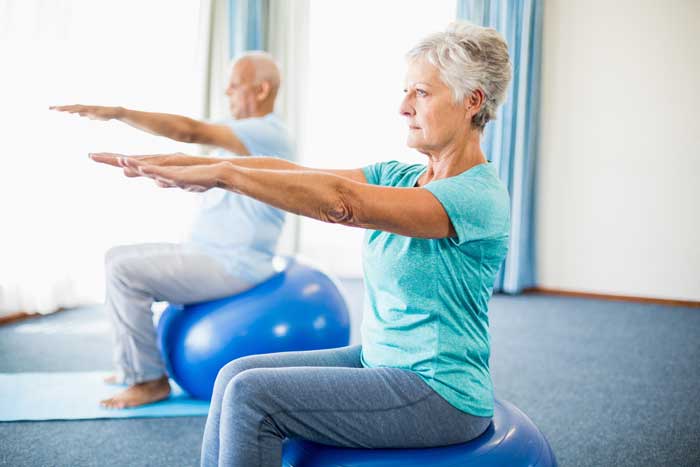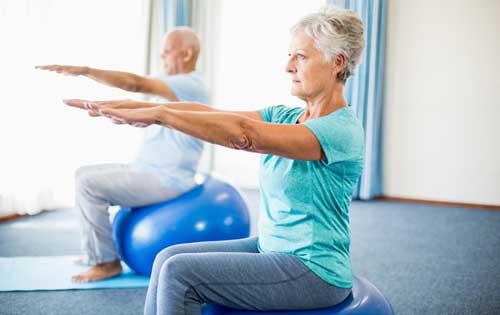Falls are one of the biggest medical problems that many older people will face. One in three adults will have a serious fall each year, and unfortunately many suffer serious complications as a result.
Falls are often considered a natural part of getting older. After hitting 30, the muscles that help you stand upright start to weaken. Your strides will begin to shorten and the pace of your steps will slow.
Ageing isn’t, however, the only reason that you start to lose your sense of stability. Balance is an exercise and, the more you do it, the better you become at it. You can maintain a sense of balance by staying active.

Interested in improving your balance in your old age? We’ve got 8 tips for you here.
#1 There’s no time like the present
If you think you need to go to the gym to work on your balance, you’re wrong. You can do balance exercises anywhere, at any time – as long as you have something sturdy nearby to hold on to.
When you’re starting off, use a wall or the back of a chair to support yourself while you balance. Try doing back leg raises, side leg raises and hip extensions for two non-consecutive days in a week. These exercises overlap with lower body strength and help improve balance.
#2 Stand on one leg
Embrace your inner flamingo and stand on one leg more often. Try doing it while you are washing the dishes. Hold onto the sink while you do this. If you can stay upright for 30 seconds on each side, try improving the length of time you do it for to really challenge yourself.
#3 Get proper sleep
Sleep deprivation slows your reaction time, meaning you don’t react as quickly if you do fall. Some studies have even found that sleep deprivation is directly related to falls. One study found that of 3,000 women, those that slept between five and seven hours each night were 40 percent more likely to fall than those who slept more.
#4 Modify as you progress
Following a set number of exercises can improve your balance, but if you modify the exercises as you progress, it can continue to significantly improve your balance. If you’re using a support, such as a chair or wall, to help with the exercises, challenge yourself by slowly phasing them out. Hold on with one hand, then after a period of time, try only one finger and then, finally, no hands. If you’re still very steady, try only one leg.
#5 Close your eyes
Your vision is a large part of balancing properly. It works in combination with the inner ear to keep you upright and prevent any falls. When you are starting to do balance exercises, you should focus on a single point in the distance, in order to help yourself balance more easily.
However, over time you should think about closing your eyes, to make it harder to determine your balance and challenge yourself. Just ensure that you feel ready for the challenge and listen to your best judgement when trying this. Safety first!
#6 Look for times to be more active
Try and limit the amount of time you spend sedentary – e.g. watching TV, listening to the radio. Instead, look for times when you can be active. Walking to the shops is a great way to stay active, just don’t take the car or bus. Try using the stairs while you’re there, instead of using a lift or escalator.
#7 Do Tai Chi
Tai Chi is a Chinese exercise that is well known to improve balance and stability, focusing on movements in a slow, but incredibly controlled way. Tai Chi is an aerobic workout, roughly the equivalent to a brisk walk, and weight training. It strengthens the body, improving bone strength, joint stability, and cardiovascular health, as well as improving balance and therefore preventing falls.
#8 Build up your self-confidence
Fitness programs increases your strength, allowing you to balance better, but they also build up your confidence and make you less afraid of falling. When you’re more afraid of falling, you do less to challenge yourself. By building up your confidence, you’ll do more to be able to stop yourself falling.
Before you start exercising, we would recommend that you speak to your doctor. Remember that if you experience chest pain, dizziness or severe shortness of breath you should stop immediately and contact your GP. Where there is pain and strain – there is no gain.






